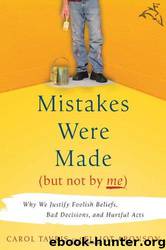Mistakes Were Made (But Not by Me)

Author:Carol Tavris
Language: eng
Format: mobi
Publisher: Houghton Mifflin Harcourt
Published: 0101-01-01T00:00:00+00:00
Chapter 6
Love's Assassin: Self-justification in Marriage
Love ... is the extremely difficult realization that something other than oneself is real.
—novelist Iris Murdoch
WHEN WILLIAM BUTLER YEATS got married in 1917, his father wrote him a warm letter of congratulations. "I think it will help you in your poetic development," he said. "No one really knows human nature, men as well as women," who has not lived in marriage—"the enforced study of a fellow creature."1 Married partners are forced to learn more about each other than they ever expected (or perhaps wanted) to know. With no one else, not even with our children or parents, do we learn so much about another human being's adorable and irritating habits, ways of handling frustrations and crises, and private, passionate desires. Yet, as John Butler Yeats knew, marriage also forces couples to face themselves, to learn more about themselves and how they behave with an intimate partner than they ever expected (or perhaps wanted) to know. No other relationship so profoundly tests the extent of our own willingness to be flexible and forgiving, to learn and change—if we can resist the allure of self-justification.
Benjamin Franklin, who advised, "Keep your eyes wide open before marriage, and half shut afterward," understood the power of dissonance in relationships. Couples first justify their decision to be together, and then to stay together. When you buy a house, you will start reducing dissonance immediately. You will tell your friends the wonderful things you love about it—the view of the trees, the space, the original old windows—and minimize the things that are wrong with it—the view of the parking lot, the cramped guest room, the drafty old windows. In this case, self-justification will keep you feeling happy about your beautiful new home. If before you fell in love with it, a geologist had told you that the cliff above you was unstable and might give way at any moment, you would welcome the information and walk away, sad but not heartbroken. But once you have fallen in love with your house, spent more than you could afford to buy it, and moved in with your unwilling cat, you have too much invested, emotionally and financially, to walk away easily. If after you are in the house, someone tells you that the cliff above you is precarious, that same impulse to justify your decision may keep you there far too long. The people who live in houses along the beach in La Conchita, California, in the shadow of cliffs that have a habit of crashing down on them during heavy winter rains, live with constant dissonance, which they resolve by saying: "It won't happen again." This allows them to remain until it does happen again.
A relationship with a house is simpler than a relationship with another human being. For one thing, it's only one-way. The house can't blame you for being a bad owner or for not keeping it clean, though it also can't give you a nice back rub after a hard day.
Download
This site does not store any files on its server. We only index and link to content provided by other sites. Please contact the content providers to delete copyright contents if any and email us, we'll remove relevant links or contents immediately.
Rewire Your Anxious Brain by Catherine M. Pittman(17619)
Talking to Strangers by Malcolm Gladwell(11954)
The Art of Thinking Clearly by Rolf Dobelli(8897)
Mindhunter: Inside the FBI's Elite Serial Crime Unit by John E. Douglas & Mark Olshaker(7873)
Becoming Supernatural by Dr. Joe Dispenza(7142)
Change Your Questions, Change Your Life by Marilee Adams(6684)
The Road Less Traveled by M. Scott Peck(6671)
Nudge - Improving Decisions about Health, Wealth, and Happiness by Thaler Sunstein(6667)
The Lost Art of Listening by Michael P. Nichols(6512)
Enlightenment Now: The Case for Reason, Science, Humanism, and Progress by Steven Pinker(6434)
Win Bigly by Scott Adams(6341)
Mastermind: How to Think Like Sherlock Holmes by Maria Konnikova(6275)
The Way of Zen by Alan W. Watts(5828)
Daring Greatly by Brene Brown(5679)
Big Magic: Creative Living Beyond Fear by Elizabeth Gilbert(4763)
Grit by Angela Duckworth(4760)
Men In Love by Nancy Friday(4366)
Flow by Mihaly Csikszentmihalyi(4078)
The Four Tendencies by Gretchen Rubin(4042)
